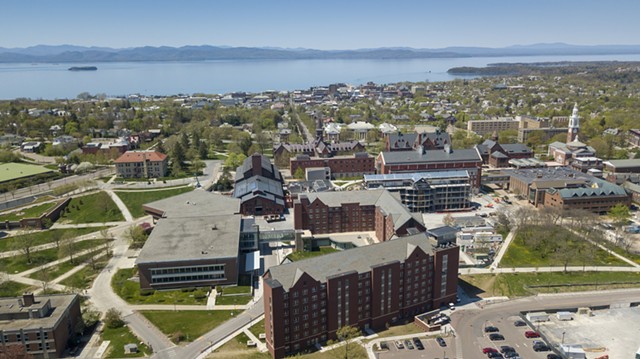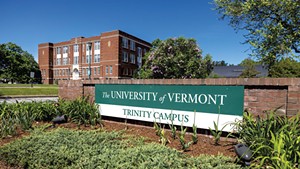
- File: James Buck
- The University of Vermont campus
After years of stalled talks, the University of Vermont has a tentative new agreement with the City of Burlington to build more student housing if its enrollment continues to grow, Mayor Miro Weinberger announced on Monday.
A draft memorandum of understanding says UVM will build 1.5 beds for every undergraduate enrolled above its fall 2023 enrollment of 11,614. In exchange, the city will modify zoning for three UVM-owned parcels — 280 East Avenue, the Waterman Block on South Prospect Street and Trinity Campus on Colchester Avenue — allowing it to build up to 1,500 new beds, the agreement says.
The deal would expire in 2028 and is subject to a council vote, planned for early next year. But it’s no sure thing: Councilors raised numerous concerns with the proposal at a meeting Monday night.
If approved, the agreement would be the first between the city and school in four years. A previous deal, which required UVM to build one bed per new student, lapsed in 2019, when UVM refused to negotiate a new one. Since then, fall undergrad enrollment has grown by more than 900 students, university data show.
Related Gowntown Development: UVM Wants to Build Dorms on Its Trinity Campus. Would That Ease Burlington’s Housing Crisis?: Locked Out Series, Part 5

Notably, the deal doesn’t change UVM’s longstanding policy to house only first-year and sophomore students on campus — meaning that while UVM has agreed to build more housing if it enrolls more students, it hasn’t agreed to house those students all four years. Those additional students could eventually seek off-campus housing, which is already in short supply.
Councilors cited those concerns in February, when UVM requested a zoning change to build 400 undergrad and 120 graduate beds at Trinity Campus. At the time, UVM officials said they didn't want to grow enrollment, but the council ultimately tabled the proposal.
The proposed agreement says UVM aims to enroll about 3,000 first-year students every fall; this year, that number was 2,896, up from 2,636 in 2019. The agreement also says UVM will provide the city with an enrollment report every year. The city zoning change would allow buildings up to 80 feet tall, compared to the 35-foot height limit in place now.
In a statement on Monday, mayoral spokesperson Samantha Sheehan said the agreement would achieve a longstanding city goal to keep enrollment from outpacing new beds. She acknowledged concerns about student overflow into city neighborhoods but pointed to UVM’s plans to build a 540-bed complex near Centennial Woods, the majority of which would be for juniors and seniors, officials have said.
Related UVM Announces Plan to Build Housing for 540 Students

“The goal and target group is juniors and seniors, but it’s not an exact science,” Cate said of filling the rooms.
Councilor Tim Doherty (D-East District) urged Cate to add specific language about who would live in the new buildings. Having more students ultimately spill into city neighborhoods would worsen “a situation that really cannot be worsened any more,” Doherty said.
“We cannot afford to have a tighter, less elastic housing market at this point,” he added.
Councilor Melo Grant (P-Central District) wanted assurances that the new beds would not end up being “forced triples,” or dorms designed for two students that are housing three due to on-campus housing constraints. Cate said he would talk to UVM’s Board of Trustees about clarifying the agreement to say the rooms would not be triples.
Councilors Zoraya Hightower (P-Ward 1) and Joan Shannon (D-South District) both said a four-year agreement would be too short, especially when UVM’s prior agreement lasted 10 years.
“It’s a lot to ask for long-term [zoning changes] when you’re only willing to give short-term things,” Hightower said. “I’m sad that this is what months of conversation has come to.”
Before Monday's meeting, Councilor Gene Bergman (P-Ward 2) told Seven Days he doesn’t think the proposed bed-to-student ratio is aggressive enough. If 100 more students enroll next year, UVM would have to build 100 beds for them, plus 50 others. That isn’t enough to address UVM’s existing housing deficit, which has squeezed students into too-small dorm rooms, Bergman said.
Even more concerning to Bergman: If enrollment stays level, the deal wouldn't require UVM to build any new beds. “It’s not ambitious enough,” he said of the proposal.
Councilor Ben Traverse (D-Ward 5), in an interview before the meeting, said the deal would ideally push UVM to build even more. But he thinks building some housing is better than none — and he recognized this may be all UVM will agree to.
“I’m grateful they’ve come as far as they have,” Traverse said. “I don’t think we should do nothing to expand housing opportunities for students in Burlington.”
“We have a need and a desire to build more housing for our students,” Cate said. “If we can’t do it in Burlington, we will have to turn to other municipalities.”














Comments
Comments are closed.
From 2014-2020, Seven Days allowed readers to comment on all stories posted on our website. While we've appreciated the suggestions and insights, right now Seven Days is prioritizing our core mission — producing high-quality, responsible local journalism — over moderating online debates between readers.
To criticize, correct or praise our reporting, please send us a letter to the editor or send us a tip. We’ll check it out and report the results.
Online comments may return when we have better tech tools for managing them. Thanks for reading.